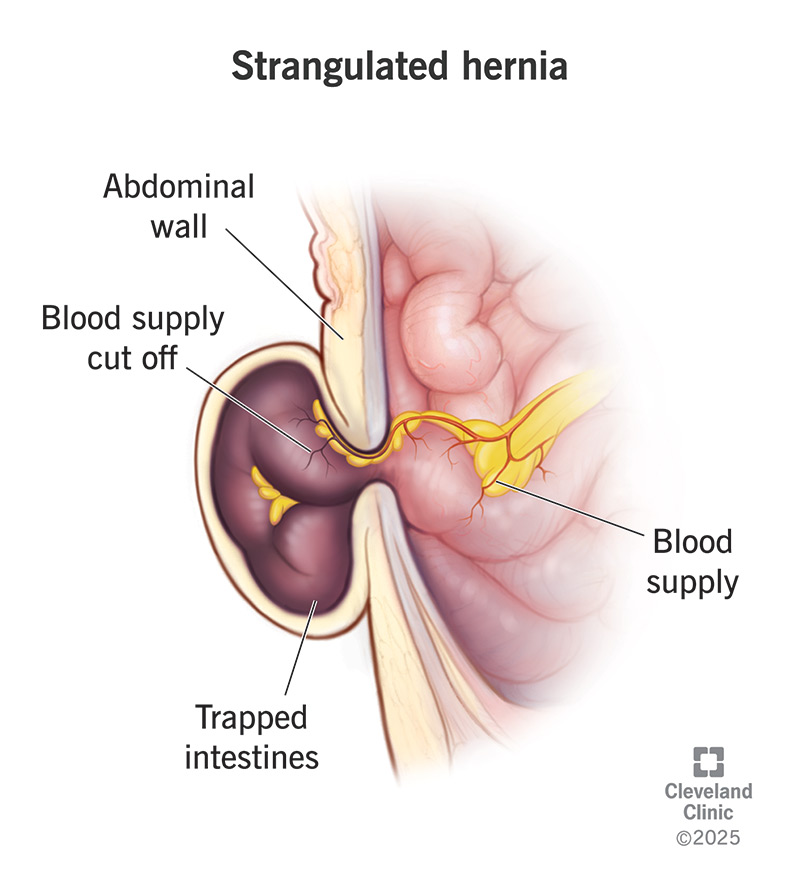A strangulated hernia is a medical emergency. It happens when blood flow to the tissue or intestine in the hernia is cut off. Blood loss causes the tissue or intestine to die. A strangulated hernia can be fatal if gangrene or sepsis sets in. Treatment is surgery to repair the hernia.
Advertisement
Cleveland Clinic is a non-profit academic medical center. Advertising on our site helps support our mission. We do not endorse non-Cleveland Clinic products or services. Policy

Image content: This image is available to view online.
View image online (https://my.clevelandclinic.org/-/scassets/Images/org/health/articles/strangulated-hernia.jpg)
A strangulated hernia is a life-threatening condition that happens when blood supply is cut off to the pieces of tissue or intestine inside the hernia. Blood carries oxygen. Without oxygen, the intestine or tissue in the hernia starts to die (necrosis). Necrosis may lead to potentially fatal conditions like gangrene and sepsis. Strangulated hernias don’t happen very often. It takes time for them to develop. Understanding how that happens may reduce your risk.
Advertisement
Cleveland Clinic is a non-profit academic medical center. Advertising on our site helps support our mission. We do not endorse non-Cleveland Clinic products or services. Policy
You may have a strangulated hernia if you have symptoms like a painful bulge or lump in your abdomen along with:
The intestine trapped in the hernia could begin to die in as little as four hours after blood supply is reduced.
Hernias develop when pieces of tissue, organs or your intestine in your abdomen push through a weak spot in the muscles that make up your abdominal wall. The hernia makes a bump or lump that you can see and feel. Often the bump or lump will come and go as the hernia goes back through the weak spot.
But hernias can get stuck in your abdominal wall (incarcerated hernia). Blood still flows to the hernia’s contents. Over time, an incarcerated hernia may get large enough that pressure from your abdominal muscles cuts off blood flow to the hernia’s contents.
A healthcare provider will do a physical examination. They’ll ask about your symptoms and your medical history. They may do tests like:
Advertisement
Open hernia repair surgery is the most common treatment. In open hernia surgery, your surgeon makes a single incision (cut) to move the hernia and its contents back in place. They’ll use stitches to close the gap in your abdominal muscles. They may sew a piece of mesh material to your muscles to support them.
Your surgeon may do a small bowel resection or colon resection surgery to treat a strangulated hernia. That may be the case if blood loss damages a piece of intestine in the hernia.
Open surgery to fix a strangulated surgery does come with some risks. Complications may include:
You may need to stay in the hospital for several nights after your surgery. It takes time to recover from surgery to repair a strangulated hernia. How much time depends on your situation.
For example, most people who have hernia surgery can return to their daily routines within a few days but with lifting restrictions. But talk to your surgeon if your daily routine involves lifting heavy objects. They’ll explain how long you should wait to start that kind of activity.
Your recovery time will be longer if you had surgery to remove a damaged intestine. It can take six weeks to recover from surgery to remove a part of your intestine. Your surgeon will explain what you can expect during your recovery.
Surgery to repair the hernia typically solves the issue. But hernias can happen again. If you’ve had hernia surgery, talk to your healthcare provider if you think you might have a new hernia. You may need surgery to repair the new hernia. Repairing the new hernia reduces the risk that it’ll become strangulated.
The overall survival rate is good. But survival rate depends on factors like your health, age and whether you have surgery to remove part of your intestine.
Strangulated hernias can lead to life-threatening sepsis or gangrene. Without treatment, gangrene and sepsis can be fatal:
Yes, it can. Talk to a healthcare provider if you think you have a hernia. They’ll let you know if you need surgery to repair the hernia and keep it from becoming incarcerated or strangulated.
Advertisement
If you have a hernia, talk to your provider about treatment. If you think you may have a strangulated hernia, go the emergency room right away. Call 911 or your local emergency number if you have symptoms like:
Hernias are common and mostly harmless. A strangulated hernia, on the other hand, is rare and a serious medical issue. If you think you have a hernia, don’t hesitate to talk to a healthcare provider. Your provider will explain your risk of developing a strangulated hernia. They’ll recommend treatment to keep that from happening.
Advertisement

Sign up for our Health Essentials emails for expert guidance on nutrition, fitness, sleep, skin care and more.
Learn more about the Health Library and our editorial process.
Cleveland Clinic’s health articles are based on evidence-backed information and review by medical professionals to ensure accuracy, reliability and up-to-date clinical standards.
Cleveland Clinic’s health articles are based on evidence-backed information and review by medical professionals to ensure accuracy, reliability and up-to-date clinical standards.
Whether you need stitches, a broken bone set or think your appendix might be causing your abdominal pain, Cleveland Clinic’s emergency medicine team is here to help.
